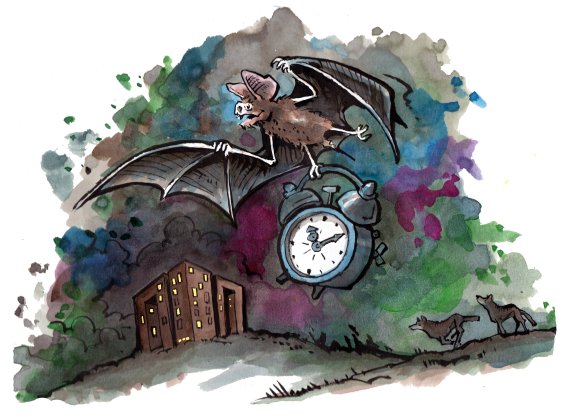Text Tessa Louwerens Illustration Henk van Ruitenbeek
Bauke Albada
Assistant professor of Organic Chemistry
‘Overtime is part of the deal, and personally I’d say 25 percent is a low estimate. By definition, scientists are people with a passion for their subject. If you’re going to be able to play a leading role in your own field, you simply do have to invest a lot of time in your research. Given that a researcher at a university has other tasks as well, such as teaching and management, he will have to make extra time to keep ahead in his scientific field. There’s nothing wrong with that in itself, but it is good if you can keep it within reason so you don’t run the risk of burnout and stress.’
Gauthier Konnert PhD candidate in Aquaculture and Fisheries
‘I think it’s fine to work longer hours occasionally, for example when running an experiment. But I don’t think it’s a prerequisite for good science. You can also stick to 40 hours a week and be a productive researcher. But research is competitive and working more hours likely yields more results and potentially more publications. In that sense, ambitious people probably tend to work overtime, which is rewarded if they do indeed get more results. It’s a personal choice and responsibility to balance your professional ambitions and personal life. If I want to work 60 hours a week no one will stop me, probably, as long as I’m doing fine. But I don’t feel pressured.’
Joris Sprakel Associate professor of Physical Chemistry and Soft Matter
‘More than anyone else, scientists should think outside the box, based on rational arguments. The reality is that in everything in our work you have to weigh up what you want to achieve against how much time you can or want to spend. It also depends on how efficiently you work and how well you set priorities. ‘Overtime’ makes it sound burdensome. I am crazy about my work so a lot of the extra hours come from sheer enthusiasm and then it doesn’t feel like work. In short, nothing is compulsory and we can all make our own choices, as long as you go on making a genuine contribution to your field, the organization, and the education programme.’
Maria Forlenza Assistant professor of Cell biology and Immunology
‘Science is the best job there is; you have flexibility and freedom. On paper nobody is asking me to work overtime and I feel it’s my choice. But to make a career you have to show you are willing to go that extra mile, and this may also require working overtime. I don’t mind working extra hours and it doesn’t frustrate me. Nevertheless, I am experiencing that there is a limit. I see many hard-working scientists putting in a lot of effort that is not always acknowledged, partly because of cutbacks on all fronts and ever higher expectations. There is only so much a person can do, even in the extra time. At that point the work starts to drain energy instead of giving energy.’
Ivonne Rietjes Professor of Toxicology
‘At the moment, working overtime is a systematic part of the deal in the sciences, and I think actually it is even more than 25 percent. The problem is that it is very difficult to get the work done in the available hours. These days you can’t get all your academic tasks done within the hours you were appointed for, especially with the large numbers of students we now have. This means you mainly get people who are extremely dedicated, and who partly see their scientific work as a hobby. And to me that’s a positive thing.’
Yannick Weesepoel Researcher a Rikilt
‘I do contract research, where you have clear-cut goals. There are firm deadlines and you need to be good at planning, but when time or the money runs out, that’s the end. It is different at the university; there the work is never done. When I was working on my PhD, no one thought twice about asking me to come in on a Saturday, and then everyone would be there, working away. Of course, I still work longer hours sometimes, but definitely not all the time. In one year there are about 1750 research hours, and if you go above that systematically, you get an extra member of staff. One person doesn’t have to do one and a half jobs.’
Bernice Bovenkerk Assistant professor of Philosophy
‘Working overtime is an unwritten norm in the sciences. A disadvantage is that it promotes inequality and I think it’s a gender issue too. I myself have children, for example, and I can’t live up to that norm. It sounds strange, but I started working four days a week so I have the chance to work overtime on my day off. I sometimes get frustrated that I don’t have enough time for things like keeping up with the literature. You have a lot of extra tasks as well as research and education. That fragmentation means you hardly get round to research in the end. I recently got a Vidi grant. So it is possible, even if you can’t do a lot of overtime.’

